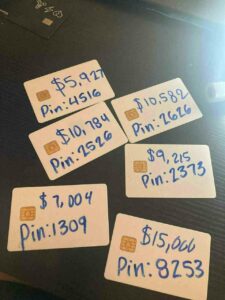Card cloning: How to protect your credit card from illegal activities
https://darkwebmarketbuyer.com/product-category/money-loaded-credit-cards-for-sale/cloned-cards/What is card cloning?
Card cloning, also known as credit card skimming, is a fraudulent practice that involves someone copying the information from the magnetic stripe of a credit or debit card. Fraudsters can then use this data to create a duplicate card to make unauthorized transactions. Cloned cards for sale
How does credit card cloning work?
Card cloning often involves the fraudster using a small device known as a skimmer. Criminals can install credit card skimmers on ATMs, point-of-sale terminals, or other card readers. When a card is swiped through the skimmer, it captures and stores all the information (e.g., card number and CVV code) from the card’s magnetic stripe.
Card cloning is a significant concern in the digital age, emphasizing the need for constant awareness and advanced security measures.
https://darkwebmarketbuyer.com/product/gsm-data-receiver-skimmer/
How to prevent card cloning
Preventing card cloning fraud involves several measures you, as a cardholder, can take to protect your financial information. Here are some key steps to help prevent card cloning:
https://darkwebmarketbuyer.com/product/1-cards-total-balance-%E2%89%88-4400/
- Use EMV chip technology. Cards with EMV chips (those small metallic squares on newer cards) are much harder to clone than magnetic stripe cards. Always use the chip instead of swiping when possible. https://darkwebmarketbuyer.com/product/emv-shimmer-for-sale/
- Regularly monitor your account statements. Frequently check your bank and credit card statements for unauthorized transactions.
- Be cautious at ATMs and POS terminals. Inspect the ATM or POS terminal before using it. Look for signs of tampering, loose parts, or anything unusual.
- Cover the keypad with your hand when entering your PIN to prevent hidden cameras from recording it.
- Use contactless payments when possible. Contactless payments like Apple Pay, Google Pay, or other NFC-based technologies are encrypted and change your card information with each transaction, making it more secure.
- Avoid using public Wi-Fi for financial transactions. Public Wi-Fi networks are less secure, making it easier for hackers to intercept your data.
- Be wary of skimmers. Skimmers are devices thieves attach to ATMs or payment terminals to capture your card information. If something looks suspicious, don’t use that terminal.
- Set up alerts. Most banks offer text or email alerts for transactions. Enable these so you’re notified of account activity.
- Only make online purchases from secure websites. Look for “https” and the padlock symbol in the URL of the store you’re shopping at to identify such online shops.
- Use strong, unique passwords for online banking. Avoid using the same password across multiple sites, and consider using a safe password manager like dark web market buyer.
- Report lost or stolen cards immediately. If your card gets lost or stolen, report it to your bank immediately to prevent fraud.
- Shred personal documents. Shred documents that contain your card or personal information before disposing of them. Doing so keeps anyone going through your trash from being able to access that information.
- Be skeptical of unsolicited calls or emails. Phishing attempts can trick you into giving away your card information. Only provide your card details over the phone or via email if you know the recipient’s identity.
https://darkwebmarketbuyer.com/product/buy-cloned-credit-cards/
Taking these precautions can significantly reduce the risk of your card being cloned and your financial information getting compromised. Remember that staying vigilant and aware of how you use your card is vital in preventing card cloning.



